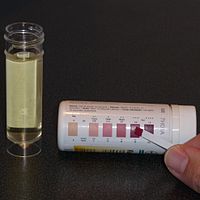
Photo from wikipedia
INTRODUCTION/AIM The gut has shown to have a pivotal role on the pathophysiology of metabolic disease. Food stimulation of distal intestinal segments promotes enterohormones secretion influencing insulin metabolism. In diabetic… Click to show full abstract
INTRODUCTION/AIM The gut has shown to have a pivotal role on the pathophysiology of metabolic disease. Food stimulation of distal intestinal segments promotes enterohormones secretion influencing insulin metabolism. In diabetic rats, oral insulin has potential to change intestinal epithelium behavior. This macromolecule promotes positive effects on laboratorial metabolic parameters and decreases diabetic intestinal hypertrophy. This study aims to test if oral insulin can influence metabolic parameters and intestinal weight in obese non-diabetic rats. METHODS Twelve weeks old Wistar rats were divided in 3 groups: control (CTRL) standard chow group; high fat diet low carbohydrates group (HFD) and HFD plus daily oral 20U insulin gavage (HFD+INS). Weight and food consumption were weekly obtained. After eight weeks, fasting blood samples were collected for laboratorial analysis. After euthanasia gut samples were isolated. RESULTS Rat oral insulin treatment decreased body weight gain (p<0,001), fasting glucose and triglycerides serum levels (p<0,05) an increased intestinal weight of distal ileum (P<0,05). Animal submitted to high fat diet presented higher levels of HOMA-IR although significant difference to CT was not achieved. HOMA-beta were significantly higher (p<0.05) in HFD+INS. Visceral fat was 10% lower in HFD+INS but the difference was not significant. CONCLUSIONS In non-diabetic obese rats, oral insulin improves metabolic malfunction associated to rescue of beta-cell activity.
Journal Title: Anais da Academia Brasileira de Ciencias
Year Published: 2017
Link to full text (if available)
Share on Social Media: Sign Up to like & get
recommendations!